The Effects Of Metformin And Pioglitazone Versus Their Low Dose Combination On Progression Of Atherosclerosis.
DOI:
https://doi.org/10.28922/qmj.2009.5.8.108-120Keywords:
metformin, pioglitazone, atherosclerosisAbstract
Background: Atherosclerotic diseases remain the leading cause of death in men and women world wide. In addition to lipid lowering, reduction of atherosclerotic disease will require further pharmacological approaches capable of modifying the disease. Materials and methods: 35 rabbits were used in this study. Atherosclerosis was carried out by feeding the rabbits an atherogenic diet (AD). The rabbits were randomly assigned into five groups, 7 rabbits each. Group 1 (normal control) received standard chow diet. In addition to AD, the rabbits in group 2 (atherogenic control), group 3 (Met), group 4 (Pio) and group 5 (Met+Pio) received no treatment, metformin, pioglitazone and combination of low doses of metformin and pioglitazone respectively for 10 weeks. At the end of 10th week, all rabbits were sacrificed; serum lipids, MDA, GSH, hsCRP, plasma fibrinogen and aortic histological examination were determined. Results: Metformin and pioglitazone resulted in significant decrease (p<0.01) in AI. Further they caused significant (p<0.01) reduction in serum MDA, hsCRP and plasma fibrinogen. Serum GSH level was significantly (p<0.05) elevated by metformin. Combination treatment decreased AI, serum MDA, plasma fibrinogen and hsCRP, increased GSH and possessed more favorable histological findings better than either drug alone.Conclusion: low doses combination of Met+Pio has more favorable atheroprotective effect than either drug alone possibly due to the combined anti-inflammatory and antioxidant effects.








